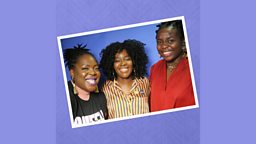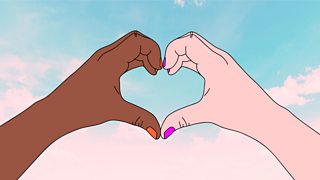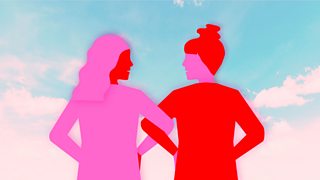How a ‘digital sisterhood’ can empower you online
As more and more of our social interactions take place online, the value of a strong digital support network has become increasingly important. Writer , actor and campaigner call their network their ‘digital sisterhood’. The trio, who all have large online followings, recently told Woman’s Hour why building a support network is so vital in the social media world. Here they explain how they use their online platforms to lift each other up and share some advice about joining or forming your own digital network…

What exactly is a digital sisterhood?
“A digital sisterhood is a collective of people who identify as sisters who are there to support each other, regardless of the circumstance. They are also there to call each other out, should it be necessary - but in a loving way,” says Kelechi Okafor.

“It’s about providing overt and covert support online”, adds Seyi Akiwowo. “[That] can look like reporting the abuse that you see rather than just scrolling past - replying to the post. It can be around supportive tweets, it can be amplifying the original message.”
Danielle Dash describes her sisterhood as, “this group of amazing women that continues to grow everyday and who hold each other to account and encourage each other to be better and celebrate each other’s wins. And hold each other when things maybe haven’t gone the way we planned.”
Why is it important to build a digital sisterhood?
For Kelechi Okafor, her digital sisterhood provides a sense of protection online against abuse. “We all know by now that women online are disproportionately the target of abuse and then when you add being a black woman on to that as well, there is a specific type of abuse that you’re constantly receiving, that mingles racism and sexism and everything comes together. It’s important when you are hyper-visible online, like I am, to have women, sisters, all across the globe, who are here on the internet and they support me and they protect me really and celebrate me. I think that’s important and I am glad that I am part of this community that I can do the same for them.”
Seyi Akiwowo agrees that a digital sisterhood can help combat online abuse: "Supporting, reporting abuse, amplifying, replying, all of that can help diffuse abuse as well as change behaviour so people can see, 'that's not how I should be behaving'."
Danielle Dash thinks it is a source of reassurance. “The world can be such a cruel place and I think with women trying to change the way things are in the way that we are treated in the home, in business, in public, I think that it’s important that we have these spaces where we can share experiences and encourage each other and let each other know that ‘oh no, you’re not crazy’ or anything that the world might tell you."
Danielle also believes that it’s helpful in boosting careers. “My digital sisterhood has helped improve my career, improve my social network and events I can go to. Resources I have access to have grown ten-fold because of my involvement in this digital sisterhood.”
Tips for creating a digital sisterhood or joining one
- Go where you are celebrated
“That means looking for things that you’re interested in, you can find it in hashtags… reading the things that people have written,” suggests Kelechi Okafor. “That’s where I think I’ve started to find my tribe really. There might be a show that I’m watching, there might be a book that I really love and looking at the hashtag, looking at the other people who are talking about it, you find other people who share your interests."

Through your collective interests and through your collective values, you build that sisterhoodKelechi Okafor
- Be careful, vulnerable and authentic when you interact with people online
“Over time that relationship builds. It’s not something that happens overnight but slowly you all start to find each other,” says Kelechi. “Through your collective interests and through your collective values, you build that sisterhood.”
- Be really supportive
Seyi Akiwowo suggests that you can be really supportive by: “Liking, retweeting, noticing people’s efforts who are speaking up and sticking their head above the parapet.”
- Learn when to amplify rather than comment
“I’m a black, queer woman, able-bodied and cis-gendered, those are my intersections of my womanhood,” says Danielle. “So for me, if there’s a situation or a topic or a discussion of the day that’s happening online on social media, or in the digital sphere... if there’s a situation around trans people, my instinct is to hear what my trans sisters are saying and amplify their voice. Sometimes I’m not the best person to speak and I hope I wouldn’t do that to an Asian person, I would amplify their voices. I would hope that white women amplify my voice when we are speaking about racism when it pertains to black people. So I think there are moments when your voice isn’t always going to be needed in a digital conversation.”
You can hear more from Kelechi Okafor, Danielle Dash and Seyi Akiwowo about digital sisterhood in this episode of Woman's Hour. We're on and too - follow us!
